Comments by Bob Greenwade
This is funny!
Hopefully not for how bad it is. ;)
303. Bell Pepper. I had been going to do something else today, but then I got a pizza last night and realized that there were two vegetables on that pizza that weren't represented yet in the Pizza Kings, Food Fight, or elsewhere. What I'm giving today is the Bell Pepper.*
Like many (I think about half, just as a guess) pieces named for food, the Bell Pepper's move roughly draws an outline of the food itself. It steps one space backward, or leaps two spaces forward to sideways; or leaps (1,2) in any backward direction; or leaps (1,3) or (2,3) in any forward direction. (bWfsDbhNfhCfhZ)

I'm undecided as to whether I should put this into the Food Fight variant; maybe if someone were to point out how one of the pieces is overwhelmingly strong or uselessly weak. (The game's probably fine as it is, though.)

And of course the model is just as vague of an approximation of the actual fruit as the move diagram.
*I may or may not present the Onion at some later date.
You'll also find two listed as #12. I need to edit the entries from Pirate to Zip and subtract one from each number.
Now the one for today...
302. Yadj / Bishop's Dog. This is a piece that initially made as part of the Tifinagh set, only to find that there was already a piece elsewhere with the exact same move. I couldn't come up with a better move for the Yadj (ⴵ) than three spaces diagonally, so I left it as-is. (B3)
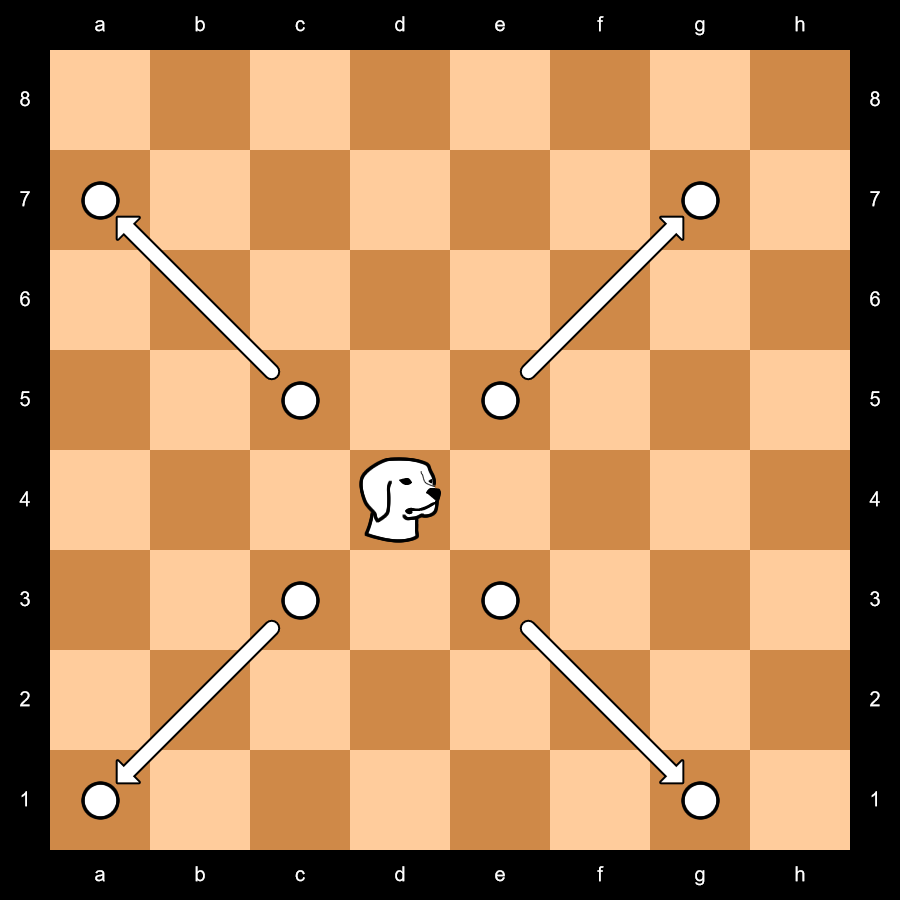
The other version of this piece, the Bishop's Dog, is one that I found in Adrian King's Jupiter, though I understand that its actual first appearance was in another of his games, Typhoon.


Whichever model is preferred, I think they'd be interesting not just in their respective home games, but as part of a CwDA set.
I corrected the XBetza as indicated.
And I'm pleased that the model triggered a positive response. It's what I was aiming for.
(Yesterday's PotD; I had a very full and tiring day.)
301. Bullet. This piece of Lev's is one that I've categorized as "technically a spear," though its truncated forward move makes it more of a Shogi-like piece. It slides normally up to four spaces forward, or steps one space backward. It also can move without capture one space sideways, though if the space is occupied and the next one over is not then it can push the occupying piece into the unoccupied one beyond. (fW4bWsmWsmpafabcduW)
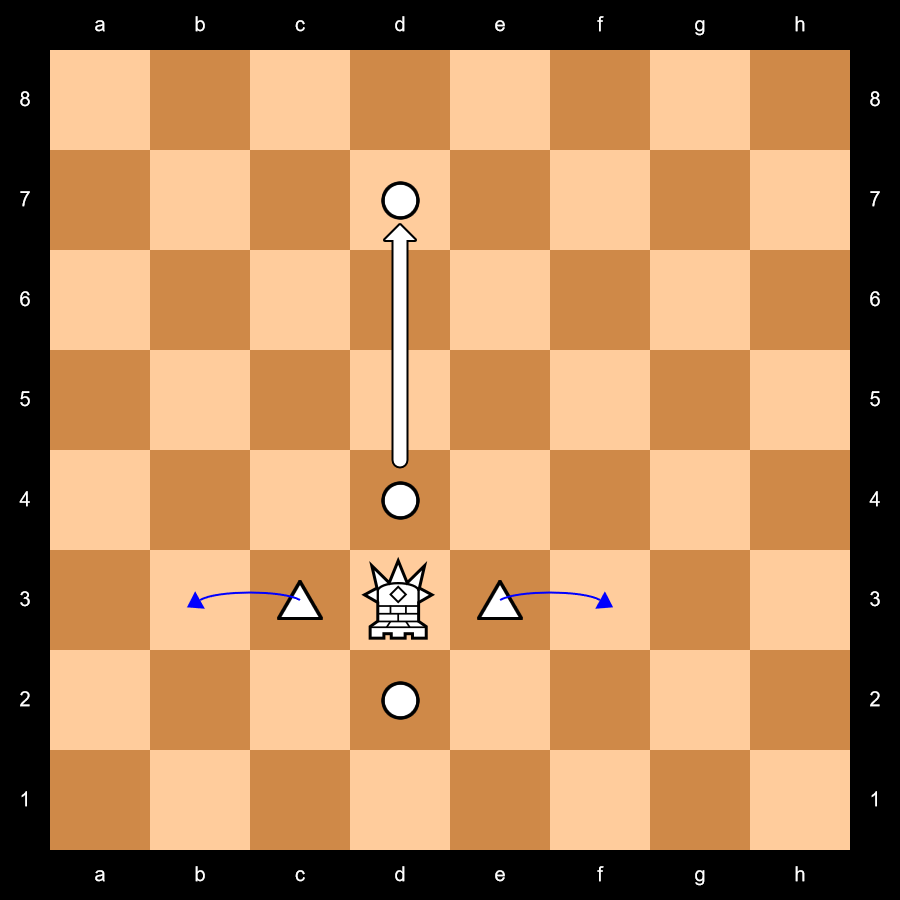
On a particularly large board (at least 16 rows), this might even be usable as a Pawn.
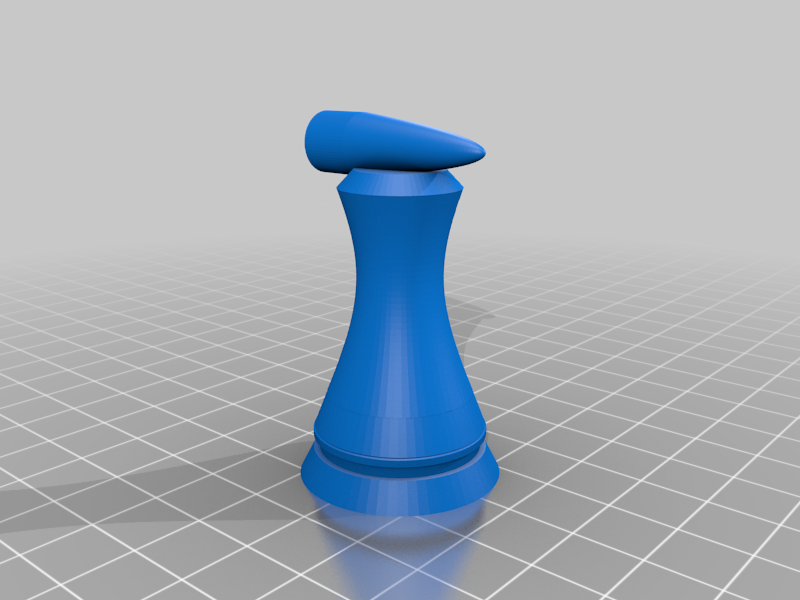
I wasn't sure I could get an effective model for this, but I thought I'd give it a shot. I think the result is of a decent caliber.
Since this comment is for a page that has not been published yet, you must be signed in to read it.
contageous=Z!R!P
Done!
Since this comment is for a page that has not been published yet, you must be signed in to read it.
Also (belated) Happy Birthday :)
Thanks! :)
I thought it was from Aurelian's Grand Apothecary Chesses?
It could well be. My memory, as I've stated many times, is pretty wretched.
Since this comment is for a page that has not been published yet, you must be signed in to read it.
Zombie Pawn: Moves (with capture) one space directly or diagonally forward, or moves without capture one space directly behind. Any piece that captures it and stops on its square immediately becomes a Zombie Pawn (but doesn't change color).
I clarified this, essentially the same way but expanding a bit more.
I'd love to make the Reaper and Mummy also immune, and there's probably some way of doing that, but I'm not sure what. If there is, maybe H.G. can chime in to help.
I guess the Vulture's move description isn't too problematic, except that the ID move does not match up with it. It should be mHnFXnNY.
Well, that's definitely a "kink." I think I miscounted or something. I changed the ID move as indicated.
I think the piece is an invention of Lev's; if it's the description that should've been changed, hopefully he'll speak up.
Well, then, maybe an army with my sillier pieces can be the Greenwade Goofballs. :)
I've also had the Linebacker Pawn, and the Left and Right End Pawns (those two haven't been in PotD yet, but they are described in Dealer's Chess). I know CwDA doesn't generally change around its Pawns, but they're something to look at.
I've also been toying with a couple of other ideas for American football-inspired pieces.
I think, too, that I'd rather call these the Gridiron Gamers. If you're going to put my name on it, I'd rather it was some of my sillier ideas like the Gerfod, the Springer, and the Portable Hole (not necessarily those specifically, but ones like them).
With my supply of pieces dwindling, I'll need these. Thanks! :)
298. Chained Bishop, 299. Chained Rook, and 300. Chained Queen. These are related to (and, unconsciously, indirectly inspired by) the Helical Switchback Rhino and Griffin that were suggested to me by fellow CVP contributor Bn Em for Unnecessarily Complicated Chess. Given that today's my birthday and this set leads into #300, I thought it seemed like a fitting moment.
These pieces start by taking one step in the direction 45° from what the name would suggest: orthogonally for the Bishop, and diagonally for the Rook. They then turn 45° toward the intended general direction, step one space, then make another 45° turn the same direction (left or right) as the previous one, and continue making alternating turns of two left and two right (in either order) until reaching their destination.
For example, here's the Chained Bishop (Wafs(afqafz)Wafsafq(afzafq)W):
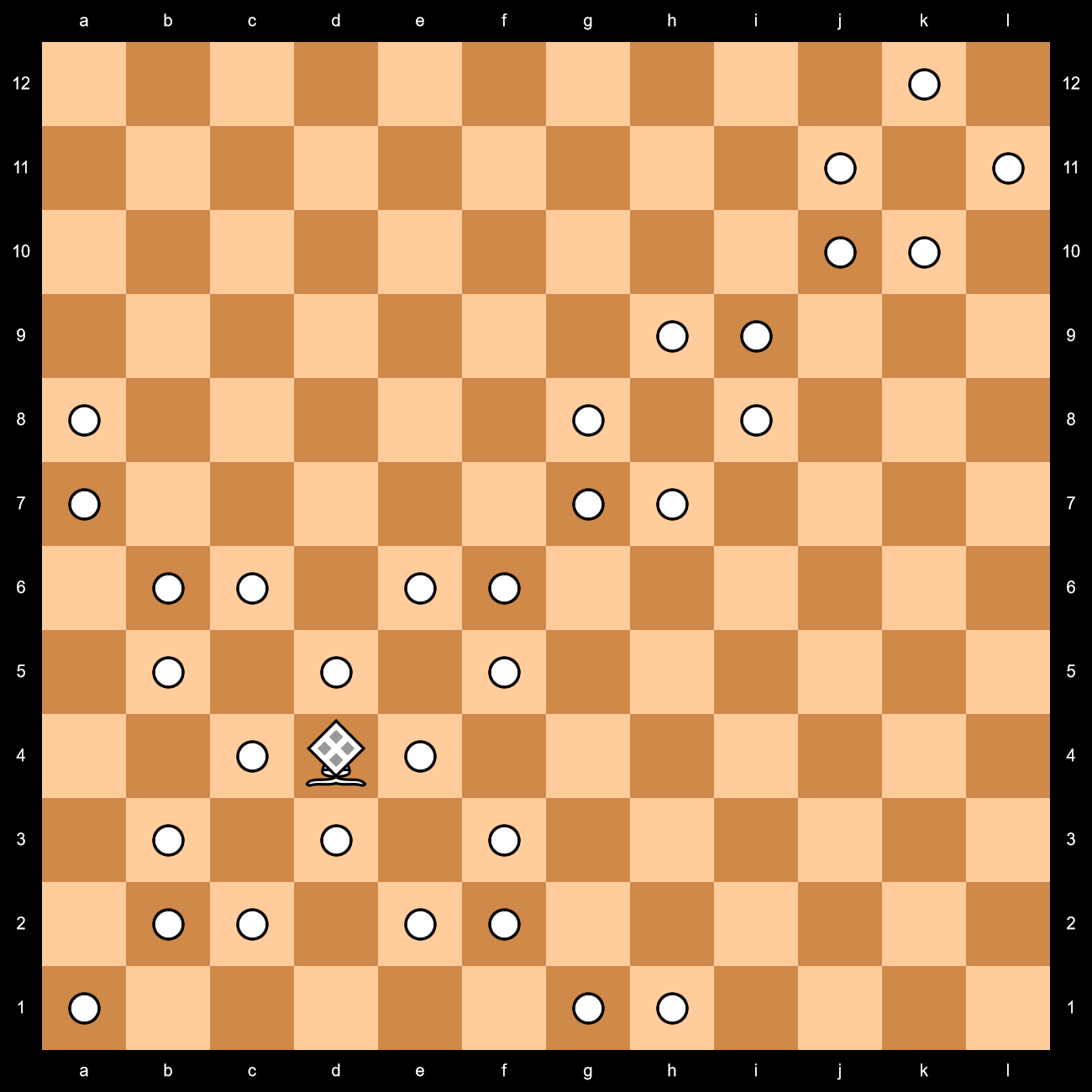
And the Chained Rook (Fafs(afqafz)Fafsafq(afzafq)F):

The Chained Queen, naturally, combines the two (Kafs(afqafz)Kafsafq(afzafq)K).



The marking for "Chained" was tossed together as a casual experiment, and I was surprised at how well it worked, at least to my eye.
I can imagine how "Chaining" could be applied to other pieces as well -- not just compounds like Chancellor and Archbishop, but also bent sliders like Rhino/Manticore and Eagle/Griffin, or even leaping sliders like Ostrich and Osprey or Tiger and Striped Dragon. (I'm not so sure how well a Chained Nightrider would work, though.)
Ah, that link works quite nicely.
So the basic Fairy in this case is basically WS, with that special property of making enemy pieces that target it switch sides for one turn. The swapping property of the more advanced versions are a bit more interesting, though if I'm doing a Fairy in Fairy Chess I'd want it to be more like what I proposed. (Not that the Discord version is a bad idea, of course; I may come up with something for the Fairy++ on the chart.)
297. Paratrooper. There actually have been a few definitions for Paratrooper before, the most notable on this site being in Pawntrooper Chess, Invasion, and (on a rhombus board) Diamond Chess 306. All of those are quite legitimate takes, but I'm not sure that even the first two could be shown on an Interactive Diagram.
The version of Paratrooper that I propose can, by default, move two spaces in any orthogonal or diagonal direction (K2). It can also, if it's in the player's starting area, move without capture any distance along those lines, leaping over any number of pieces in the way (K2(paf)mQ).
(I just finished making this entry this morning, and my brain's been too tired to make a move diagram. I'll see if I can't rectify that tomorrow, and replace this paragraph with it.)
On an Interactive Diagram, the limitation for the longer move would be done with the morph function.
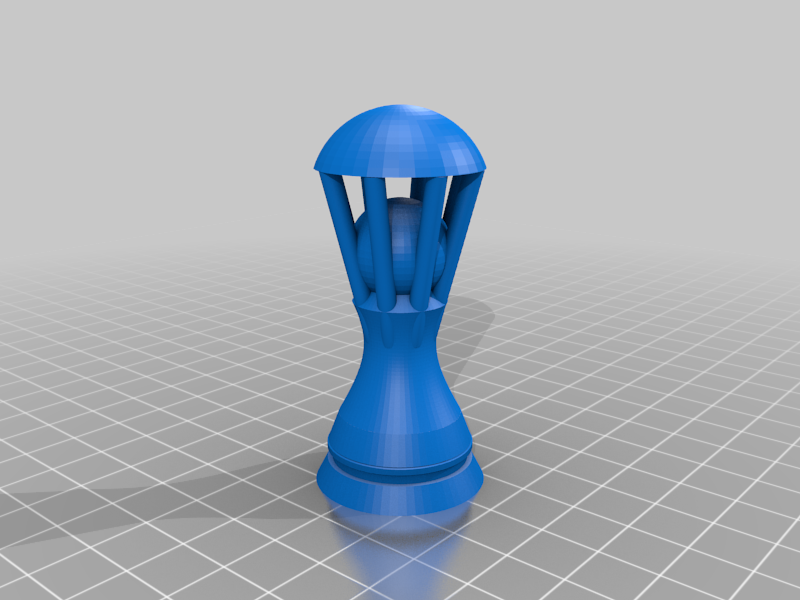
I wouldn't worry too much about the supports breaking on this; they're 3.25mm in diameter, and there are eight of them.
Since this comment is for a page that has not been published yet, you must be signed in to read it.
This piece currently moves like a Copper General in the ID. Did you mean fhKbmW?
Yes; thanks for the catch there.
Also does the contagious capture only apply when the capturer stops on the Zombie Pawn's square?
I believe it does not. I only set it up; H.G. will know how that functions. Logically, it should apply to anything but rifle captures (and Ghosts and Reapers would be immune), but I'm not sure how to set that up.
Other than that and the fact that the Vulture's kinks need sorted out, this looks good.
What further kinks are with the Vulture?
Since this comment is for a page that has not been published yet, you must be signed in to read it.
I'm unable to open that link in either Firefox or Discord.
296. Corporal. The Corporal is the most basic "improved Pawn," moving for the most part like an orthodox Pawn except that its forward diagonal move does not require capture. (fFfmWifmnD)
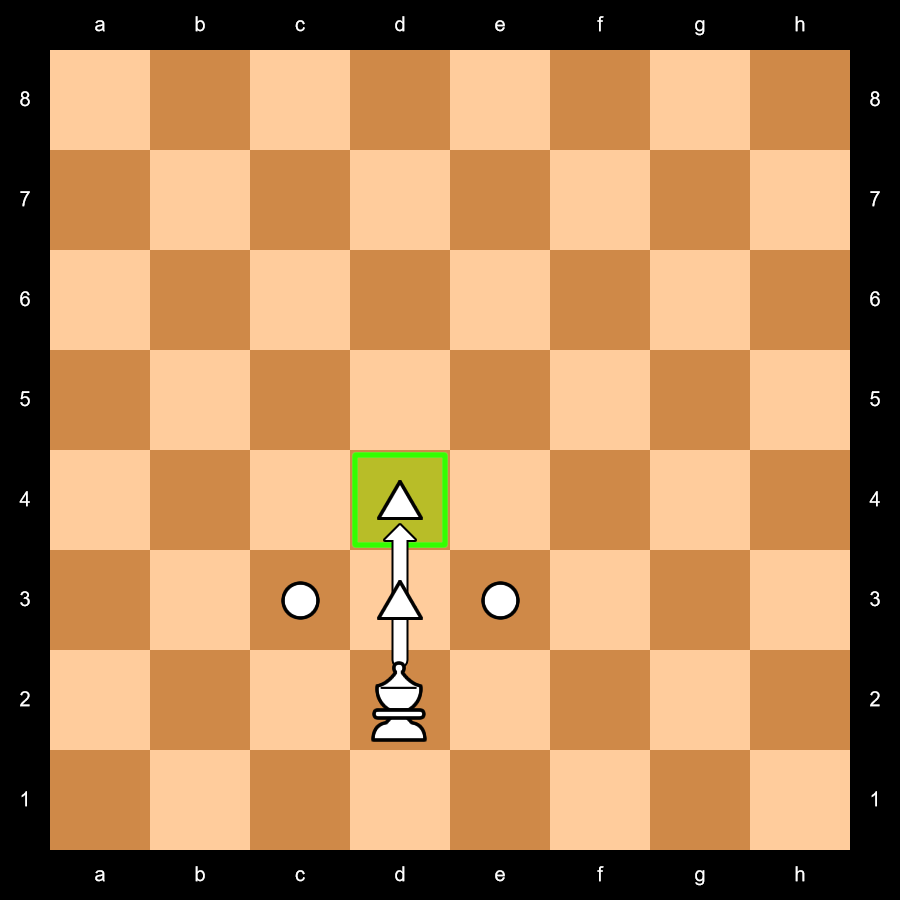
I don't see this piece much, but I think the intent is that it will appear as an auxiliary to conventional Pawns.
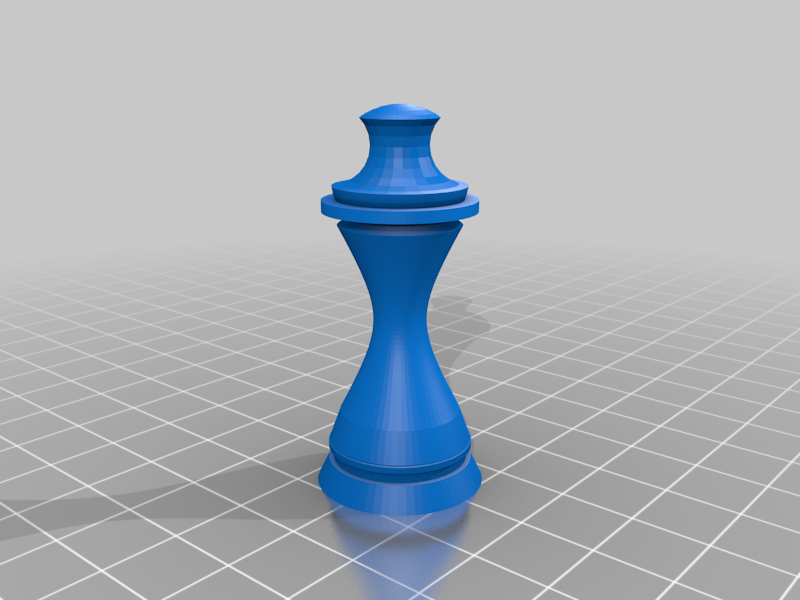
The model is utilitarian, simple, and certaintly no less stable than an orthodox Pawn. (I based its look off the Musketeer icon for the piece.)
25 comments displayed
Permalink to the exact comments currently displayed.
Well, the bell pepper kinda does, at that.
(Green ones and red ones taste pretty nice on pizza or in salads, too.)